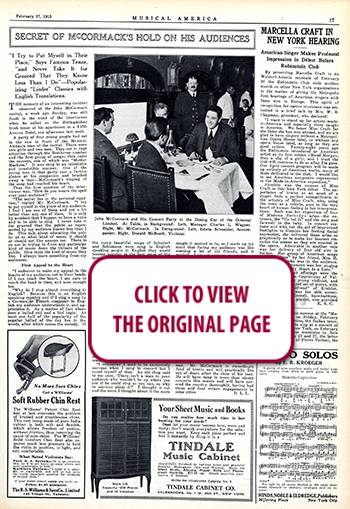 100 YEARS AGO...IN MUSICAL AMERICA (81)
100 YEARS AGO...IN MUSICAL AMERICA (81)
February 27, 1915
Page 17
SECRET OF MCCORMACK’S HOLD ON HIS AUDIENCES
“I Try to Put Myself in Their Place,” Says Famous Tenor, “and Never Take It for Granted That They Know Less Than I Do”—Popularizing “Lieder” Classics with English Translations.
THE memory of an interesting incident observed at the John McCormack recital, a week ago Sunday, was still fresh in the mind of the interviewer when he called on the distinguished Irish tenor at his apartment in a Fifth Avenue Hotel, one afternoon last week.
A party of four young people had sat in the row in front of the MUSICAL AMERICA man at the recital. There were two girls and two men. They sat in rapt attention through the Beethoven number and the first group of songs; then came the encores, one of which was “Mother Machree.” It was sung in an inimitable and irresistible manner. One off the young men in that party cast a furtive glance at his companion and brushed away a tear—McCormack’s singing of the song had reached his heart.
Thus the first question of the interviewer was, “How do you weave the spell over your audience?”
“The secret lies in the personal equation” replied Mr. McCormack. “I try to put myself in the place of my audience. I feel I am one of them and not a bit better than any one of them. It is only by accident that I happen to have a voice and to be able to sing. I never take it for granted that the public as represented by my audience knows less than I do. This talk about educating the public as to what kind of music it should or should not like annoys me. There is no use in trying to force any particular kind of music down the throats of the public. Give them the kind of music they like. I always learn something from my audiences.
First Appeal to the Heart
“I endeavor to make my appeal to the hearts of my audience, not to their heads. If I can touch the heart, I am sure to reach the head in time, and soon enough too.
“Why do I sing almost everything in English? Because this is an English speaking country and if I sing a song by a German or French composer in English my audience understands it and appreciates it. As a matter of fact where does a ballad end and a lied begin. At least one half of the popularity of the popular ballad of the day lies in the words, after which comes the melody. If the many beautiful songs of Schubert and Schumann were sung to English speaking people in English they would become popular in the best sense of the term.
“For example, the first song in the second group on my program, a week ago Sunday, “The Singer’s Consolation” by Schumann, has the sort of words that appeal and a perfectly beautiful melody. It is the kind of a German song which would become popular with English speaking people in this country if sung oftener in English. It is one of a number in the Max Heinrich edition which has some wonderful translations by Alice Matullah. As a rule I am obliged to sing Italian arias and songs in Italian because there are no good translations.
Art in Ballad Singing
“To my mind it requires just as much art to sing a ballad properly as it does to sing a great aria. I have given as much careful study to the folk songs I have introduced in my programs as I have to what are considered much more pretentious compositions. I have just come across some new melodies in folk song style to which I will set words and some of these I will bring out next season.
“I remember I used to be excessively nervous when I sang in concert but I cured myself of that. An old chap said to me once, ‘There isn’t a man in your audience who wouldn’t be up where you are if he could sing as you can, so why be nervous about it?’ I thought it out and the more I thought about it the more simple it seemed to be, so I made up my mind that facing my audience was like meeting a lot of old friends, and it worked. I am not nervous any more.
“I find my audience sympathetic. Why? Because I assume that attitude toward them. My attitude is one of appreciation. It pleases me if I please them and I appreciate their applause. I remember my first appearance in San Francisco. It seemed as though everyone in the audience was ‘from Missouri’ and I had to ‘show them.’ By the time I finished there was the greatest enthusiasm.”
Feathered Vocal Artistry
At this point little Gwendolyn, the youngest of the two charming McCormack children, came in followed by Mrs. McCormack and Cyril, the boy of eight, and announced it was time for tea. The hearty mountain canary, a Christmas gift to Cyril, and now a rival of the tenor in the McCormack household for vocal honors, began an exhibition of ‘perfect vocal art,’ according to Mr. McCormack and the interview was at an end.
If the war continues Mr. McCormack and his family will take a place in the country near New York for the Summer. Mr. McCormack is exceedingly fond of tennis and will practically live out of doors after the close of his tour. He will have sung in more than ninety concerts this season and will have covered the country thoroughly, having had three and four return engagements in some cities. —D. L. L.




 RENT A PHOTO
RENT A PHOTO





